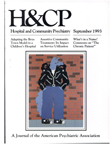Clinical Significance of Inpatient Family Intervention: Conclusions From a Clinical Trial
Abstract
Objective: To test whether the statistically significant results of a randomized clinical trial of an inpatient family intervention were clinically significant for hospital practice, the authors reanalyzed outcome data using a measure of clinical significance based on the extent to which patients bad recovered during the course of the intervention. Methods: A total of 169 hospitalized subjects and their families were randomly assigned to a psychoeducational inpatient family intervention or to a comparison group. Patient and family outcome measures were assessed at admission, discharge, and six and 18 months after admission. Analyses of statistically significant differences in outcome suggested that inpatient family intervention was effective for certain patient subgroups identified by gender and diagnosis. Global Assessment Scale scores two or more standard deviations above the pretreatment ( admission) mean were used as indicators for clinically significant improvement. Results: The reanalysis confirmed that inpatient family intervention was associated with clinically significant improvement at discharge, especially for female patients and patients with chronic schizophrenia and bipolar disorder. These effects were maintained six months after admission before attenuating at 18 months. Conclusions: inpatient family intervention results in clinically meaningful outcomes for certain subgroups of patients ad their families.
Access content
To read the fulltext, please use one of the options below to sign in or purchase access.- Personal login
- Institutional Login
- Sign in via OpenAthens
- Register for access
-
Please login/register if you wish to pair your device and check access availability.
Not a subscriber?
PsychiatryOnline subscription options offer access to the DSM-5 library, books, journals, CME, and patient resources. This all-in-one virtual library provides psychiatrists and mental health professionals with key resources for diagnosis, treatment, research, and professional development.
Need more help? PsychiatryOnline Customer Service may be reached by emailing [email protected] or by calling 800-368-5777 (in the U.S.) or 703-907-7322 (outside the U.S.).



